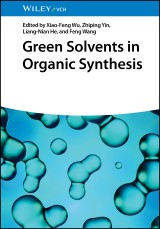Details

Green Solvents in Organic Synthesis
1. Aufl.
|
142,99 € |
|
| Verlag: | Wiley-VCH |
| Format: | |
| Veröffentl.: | 05.03.2024 |
| ISBN/EAN: | 9783527841929 |
| Sprache: | englisch |
| Anzahl Seiten: | 464 |
DRM-geschütztes eBook, Sie benötigen z.B. Adobe Digital Editions und eine Adobe ID zum Lesen.
Beschreibungen
<b>Green Solvents in Organic Synthesis</b> <p> <b>Essential reference on replacing conventional solvents with greener alternatives in industrial chemicals synthesis and production</b> <p>A well-timed book promoting sustainability in synthesis and production of chemicals, <i>Green Solvents in Organic Synthesis </i>details various green solvents, solvent systems, and solubilization techniques, including their chemistry, physiochemical properties, performance, and distinct applications, presenting a greener approach to conventional solvents by replacing them with sustainable alternatives that have similarities in their reaction mechanisms. <p>Edited by four highly qualified academics with significant research experience in the field, <i>Green Solvents in Organic Synthesis </i>includes information on: <ul><li>Water and liquid polymers (Polyethylene glycol PEG), Acetonitrile, DMSO, Dimethyl carbonate, Ionic liquids, and Supercritical fluids)</li><li>Bio-based solvents (Cyrene, γ-Valerolactone (GVL), Lactic acid, 2-MeTHF) and deep eutectic solvents (DESs)</li><li>Alcohols (MeOH, EtOH, i-PrOH, n-BuOH, t-BuOH, Ethylene glycol), ketones (Acetones, MEK, MIBK, Cyclohexanone), and esters (Methyl acetate, Ethyl acetate, i-PrOAc, n-BuOAc)</li><li>Technical, economic, and environmental aspects of green solvents and how to maximize their reuse and recycling to alleviate pollution and reduce energy consumption</li></ul> <p>For chemists in a variety of disciplines, <i>Green Solvents in Organic Synthesis </i>is an essential reference that provides foundational knowledge of green solvents, along with key features of each class of green solvent within the context of organic reactions for industrial and laboratory synthesis.
Chapter 1 General comments on green solvents <br> Chapter 2 Water <br> Chapter 3 Liquid Polymers (Polyethylene glycol PEG) <br> Chapter 4 Alcohols (MeOH, EtOH, i-PrOH, n-BuOH, t-BuOH, Ethylene glycol) <br> Chapter 5 Ketones (Acetones, MEK,MIBK, Cyclohexanone) and Esters (Methyl acetate, Ethyl acetate, i-PrOAc, n-BuOAc) <br> Chapter 6 Acetonitrile <br> Chapter 7 DMSO <br> Chapter 8 Dimethyl carbonate<br> Chapter 9 Ionic liquids<br> Chapter 10 Supercritical fluids <br> Chapter 11 Bio-based solvents (Cyrene?,¿-Valerolactone (GVL), Lactic acid, 2-MeTHF) <br> Chapter 12 Deep eutectic solvents (DESs) <br>
<p><i><b>Xiao-Feng Wu, PhD, </b>is a Professor at Dalian Institute of Chemical Physics, CAS.</i> <p><i><b>Zhiping Yin, PhD, </b>is a Professor at the School of Pharmacy of Jiangsu University.</i> <p><i><b>Liang-Nian He, PhD, </b>is a Professor at Nankai University. </i> <p><i><b>Feng Wang, PhD, </b>serves as the vice director of Dalian Institute of Chemical Physics, CAS and the director of the Biomass-Conversion and Bio-Energy division at the Bioenergy Chemical Group.</i>
<p> <b>Essential reference on replacing conventional solvents with greener alternatives in industrial chemicals synthesis and production</b> <p>A well-timed book promoting sustainability in synthesis and production of chemicals, <i>Green Solvents in Organic Synthesis </i>details various green solvents, solvent systems, and solubilization techniques, including their chemistry, physiochemical properties, performance, and distinct applications, presenting a greener approach to conventional solvents by replacing them with sustainable alternatives that have similarities in their reaction mechanisms. <p>Edited by four highly qualified academics with significant research experience in the field, <i>Green Solvents in Organic Synthesis </i>includes information on: <ul><li>Water and liquid polymers (Polyethylene glycol PEG), Acetonitrile, DMSO, Dimethyl carbonate, Ionic liquids, and Supercritical fluids)</li><li>Bio-based solvents (Cyrene, γ-Valerolactone (GVL), Lactic acid, 2-MeTHF) and deep eutectic solvents (DESs)</li><li>Alcohols (MeOH, EtOH, i-PrOH, n-BuOH, t-BuOH, Ethylene glycol), ketones (Acetones, MEK, MIBK, Cyclohexanone), and esters (Methyl acetate, Ethyl acetate, i-PrOAc, n-BuOAc)</li><li>Technical, economic, and environmental aspects of green solvents and how to maximize their reuse and recycling to alleviate pollution and reduce energy consumption</li></ul> <p>For chemists in a variety of disciplines, <i>Green Solvents in Organic Synthesis </i>is an essential reference that provides foundational knowledge of green solvents, along with key features of each class of green solvent within the context of organic reactions for industrial and laboratory synthesis.
-
-
© 2024 media control GmbH
Alle Preise enthalten die gesetzliche Mehrwertsteuer. - AGB
- Impressum
- Datenschutzerklärung
- Kontakt
- FAQ
- Mein Konto
- Home
- Erweiterte Suche
- Widerrufsrecht
- Reader-Software
- Desktop-Ansicht
- Gutschein-Code einlösen
- English


